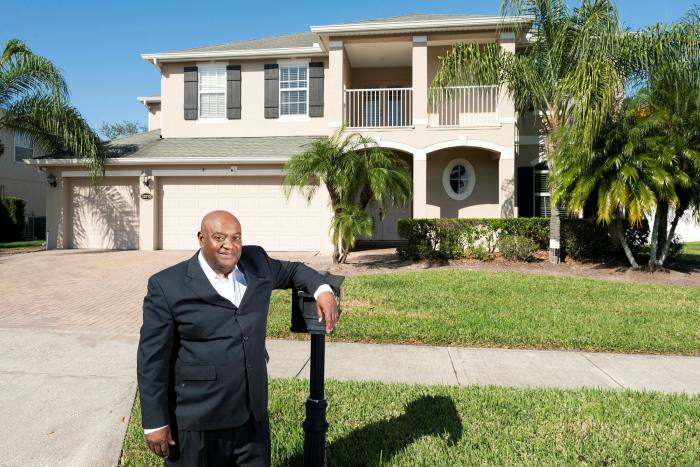When Frank Sledge took out a mortgage on the eve of the 2008-09 recession, he set off a series of personal disasters that ended in bankruptcy, foreclosure and ejection from his Florida home.
Unable to obtain another loan, Sledge thought the door to home ownership had slammed shut. But then a company backed by Wall Street investors made him an enticing offer: it would buy a house of his choice and rent it to him, with the promise that he could purchase the property for a fixed price if he came up with the money within five years.
“I thought the value of the house would go up,” says Sledge, who works as a database administrator for a local healthcare company. He hoped the deal would give him time to repair his credit and eventually qualify for another mortgage. “If right now there’s a house worth $1m and I can buy it for [a lot less], I don’t care what your credit is at that point. You know somebody somewhere will finance you.”
It has not worked out that way. Sledge says he gave up his right-to-purchase lease in 2020, placing him among thousands of right-to-buy renters who end up relinquishing a deal they once saw as the best remaining chance to gain a tentative foothold on the property ladder.
Companies pushing such offers are hot property in Silicon Valley and on Wall Street. In the western US, there is ZeroDown, a start-up backed by Y Combinator, the business incubator behind such internet hits as Instacart and Airbnb. In the middle of the country, there is Landis Technologies, which has received investment from entertainers Jay-Z and Will Smith, as well as venture firm Sequoia Capital.
But by far the biggest rent-to-buy landlord is Home Partners of America. Set up by pioneering bond trader Lewis Ranieri in 2012, the company owns 17,000 houses across America, among them Sledge’s five-bedroom villa in the Florida city of Orlando.

Blackstone bought Home Partners in July for $6bn. The private equity firm’s biggest bet on suburbia since the foreclosure crisis throws into focus what insiders and some investors say is an unanswered question about the new rent-to-buy model. Is it a financial innovation that will unlock the promise of home ownership for Americans who have been shut out of mortgage finance? Or is it primarily a way of sourcing properties to create a new breed of corporate landlord?
Home Partners presents itself in altruistic terms as a new path for ordinary Americans to become homeowners. “We have a social purpose,” chief executive Bill Young told an audience at Harvard University two years ago. “We would never do anything predatory . . . We set up the company because we wanted to help people get into great quality housing.”
The evidence from cities such as Orlando suggests a more complicated reality. Definitive information on rent-to-buy contracts is hard to find because US property records are scattered across thousands of local registries and residential leases do not typically leave any public record.
Yet by reviewing property deeds and litigation filings from four Florida counties that offer unrestricted access to many public records, the Financial Times pieced together a picture of the company’s operations in one of America’s fastest-growing metropolitan areas.
Those data give a flavour of the landlord-tenant frictions that can make owning a house more desirable than renting one. Some residents complained of property maintenance problems or unclear billing practices, while others fell behind on the rent and were hit with eviction proceedings.
For many families, a rent-to-buy lease has been a ticket to avoiding such tensions forever. Across the country, thousands of Home Partners tenants have bought the company out of leases, and many enjoyed immediate windfalls. The company reckons that house prices have risen so much in Orlando that, if its around 345 lease-purchase tenants in the city exercised their options today, they would own homes worth on average $27,000 more than the purchase prices agreed at the beginning of their tenancies.
Those outcomes are, however, not the majority. Home Partners says that around one-fifth of its tenants end up buying their homes. The rest choose to give up their houses for a variety of reasons, it says. They leave behind attractive properties that Home Partners can then lease to new residents on ordinary rental terms.

The company insists that it does not charge extra for offering tenants a right to purchase. But documents seen by the FT suggest that many Home Partners tenants have paid more than computer-generated estimates of the market rent for their homes.
Young declined through a spokesperson to be interviewed, but Home Partners disputed the FT’s findings. In a statement, it said the “premise” of this article was “inaccurate”, adding that it considered details put for comment reflected “biased reporting”.
The company added: “We . . . reiterate our commitment to providing American families with flexibility, transparency and choice when it comes to finding a great home.”
The ‘kings’ of mortgage finance
When Ranieri and Young first developed their rent-to-buy concept nearly a decade ago, they needed money, so they paid a visit to BlackRock, the world’s biggest asset management firm. “There they were, Larry [Fink] and Lewis, the two kings of mortgage finance,” says a person who was in the room.
The two men had revolutionised housing finance once before. Now BlackRock’s chief executive, Fink had been among a group of financiers who spent the early 1980s devising a way to turn hundreds of ordinary home loans into bonds that rating agencies reckoned were as safe as government debt. Ranieri was an evangelist for the technique, explaining how Wall Street was cutting the cost of American homes.
His new venture offered something for everyone. BlackRock became Home Partners’ biggest financial backer in 2014. Brokers soon learnt they could earn a commission for representing “homebuyers” who did not have enough money to buy a home. Sellers were happy to deal with a company that moved fast and paid cash. “They lowered the price a bit,” says Eddy Gay, who sold a house in Florida to Home Partners in 2019. “But they covered a bunch of closing costs, and the title search.”
To aspiring homeowners who feared that depleted savings, battered credit or other circumstances might prevent them from buying again, Home Partners offered hope. Unlike most other landlords, the company provides tenants with a five-year rent schedule, with fixed annual bumps that, it says, are below market averages.

One taker was Carly Evans, who moved to Orlando’s up-and-coming Baldwin Park district in 2018. “I know the area pretty well, and it’s hard to find places for rent,” she says. “The cool thing about [Home Partners] was, this was an actual house that I got to pick out, as if I was going to buy it.”
By promising tenants that they might one day own their own homes, Ranieri and his team had created a rental business with economics like no other. Other corporate landlords had to hire legions of professionals to scout for properties to buy. But Ranieri set things up so that “the tenants were doing the sourcing for him”, says one person who heard the pitch.
The houses tend to be of high quality because would-be tenants are often choosy buyers. Home Partners typically spends $8,000 fixing up the houses it buys, far less than the $39,000 that Invitation Homes, a property company which Blackstone used to own before it floated in 2017, says it spends on an average makeover. And unlike other corporate landlords who must show empty houses to potential renters while paying the carrying costs, Home Partners rarely buys a house unless it has already signed a lease.
When tenants exercise their right to buy, Home Partners reaps gains of tens of thousands of dollars on the price it originally paid — an amount that is typically lower than the purchase price agreed with the tenant. When they do not, Home Partners says it does about as well as an average landlord. “We’re charging something very close to a market rent,” Young told an interviewer in 2015. “We hope it’s market rent.”
Yet in a 2018 presentation given as they were seeking to sell the company, Home Partners executives seemed to arrive at a different assessment. Discussion materials seen by the FT and described by a person familiar with their contents detail how the company had compared the “contractual rent” paid by Home Partners tenants with estimates produced by two “AVMs” or automated valuation models, which are computer programs that use a large number of data points to estimate the market rent for a portfolio of properties.
The conclusion: Home Partners tenants with lease-purchase contracts paid about 10 per cent more in monthly rent than the market rate predicted by either model.

In a statement to the FT, Home Partners disavowed that finding and said it was “entirely false and grossly misleading to claim that [right-to-purchase] residents are paying more”.
“There is zero cost associated with the purchase option,” the company added. “That is a fact and no attempt to twist dated, cherry-picked data for the…
Read More:Blackstone’s new real estate play: the rent-to-buy market
2022-01-18 16:35:33
